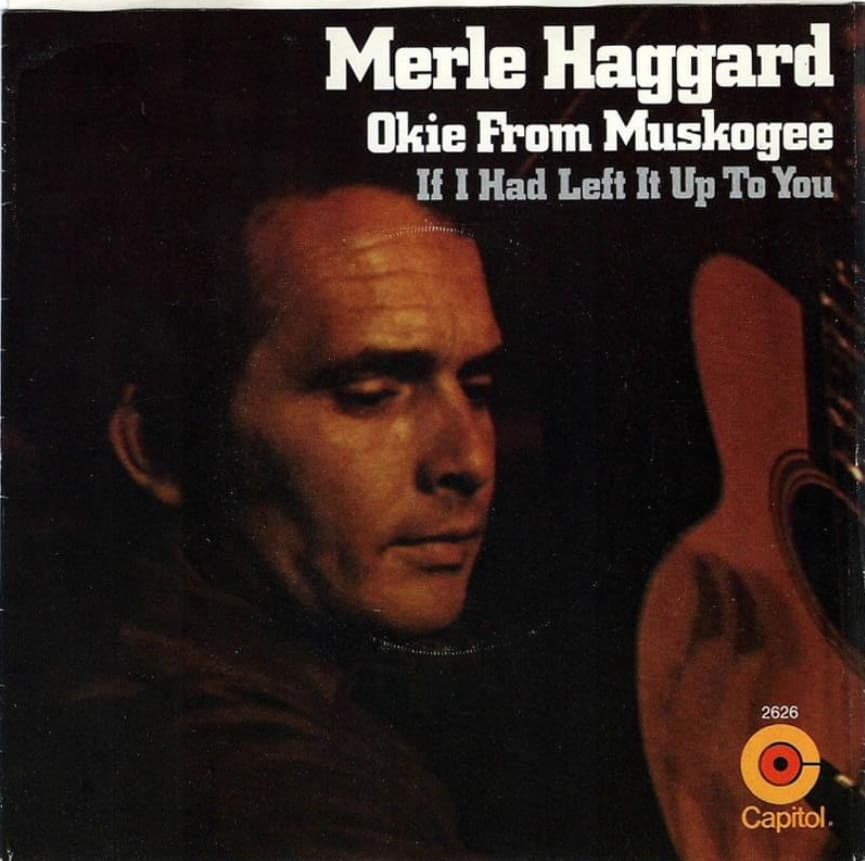
Merle Haggard’s “Okie from Muskogee”: A Patriotic Anthem of the Heartland
Released in September 1969, “Okie from Muskogee” by Merle Haggard and The Strangers quickly cemented its place in the annals of country music history. Co-written with drummer Roy Edward Burris, the song became an iconic reflection of small-town American values amidst the tumultuous backdrop of the Vietnam War and the 1960s counterculture movement. Its debut as the lead single and title track from the album Okie from Muskogee saw it rise to the top of the charts, reaching No. 1 on the Billboard Hot Country Singles chart by November 15, 1969, where it stayed for four weeks. Additionally, it made a notable crossover to the pop charts, peaking at number 41 on the Billboard Hot 100.
Merle Haggard penned “Okie from Muskogee” as a reaction to the widespread Vietnam War protests, encapsulating a sentiment of support for American troops and a bewilderment towards the anti-establishment youth. The term “Okie” refers to someone from Oklahoma, and Muskogee, the 11th largest city in the state, became a symbol of the traditional, patriotic heartland. Haggard’s lyrics proudly declared the conservative values of small-town America, where people did not smoke marijuana, take LSD, wear beads and sandals, burn draft cards, or challenge authority.
The song was born out of Haggard’s personal disillusionment with the anti-war demonstrations. As he expressed in interviews, having experienced the deprivation of freedom during his time in prison, he felt a deep respect for the soldiers fighting overseas. Haggard viewed the protests as a disrespect to those risking their lives, a sentiment that found a powerful outlet in “Okie from Muskogee.” He intended the song to support the troops and to highlight the pride and patriotism of Middle America during what he considered a peak time for the nation.
In a 2010 interview with American Songwriter, Haggard described “Okie from Muskogee” as a “character study,” portraying the perspective of his 1969 self. He acknowledged that the song’s message evolved with him over the years, stating that he performed it with a different attitude and understanding as he became more educated and his views matured. Initially perceived as a straightforward anthem, it later revealed layers of satire and humor, especially as covered by various countercultural artists like The Grateful Dead and The Beach Boys, who found an ironic charm in its lyrics.
Despite its initial reception as a redneck anthem, “Okie from Muskogee” resonated broadly, even among those it seemingly critiqued. The song’s earnest delivery and catchy tune allowed listeners to appreciate it both for its musicality and its cultural commentary. Kurt Wolff, a music critic, noted that Haggard saw the song partly as a spoof, yet it struck a chord with many who took its message to heart.
The live version of “Okie from Muskogee,” recorded during a 1970 concert in Philadelphia and featured on the album The Fightin’ Side of Me, added another layer of popularity. This recording captured the enthusiasm of the audience and Haggard’s interactive performance, solidifying the song’s status as a live favorite.
“Okie from Muskogee” earned prestigious accolades, including the Country Music Association Single and Album of the Year in 1970, reinforcing its impact on the genre. Its legacy endures as a powerful representation of a specific time and place in American history, showcasing Merle Haggard’s ability to encapsulate complex social dynamics through his music.